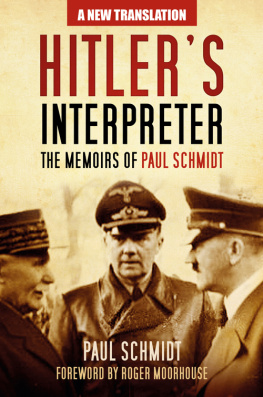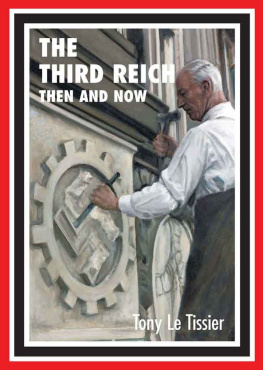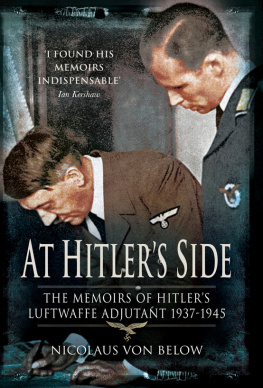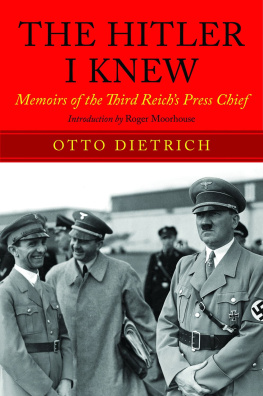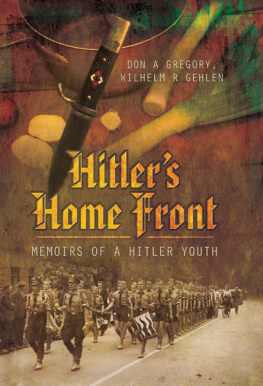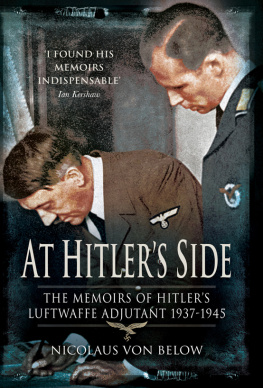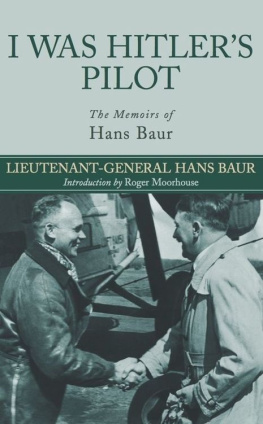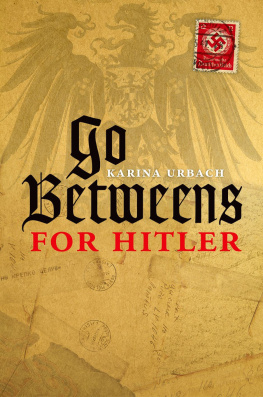
FOUR
R ight from the beginning of 1938 it was clear, despite what Hitler had said in 1937, that the period of surprises was by no means over. First came the internal crisis of February, in the course of which von Neurath was sacked and succeeded by Ribbentrop as Foreign Minister. Then came the entry of German troops into Austria, and the Czech crisis of September, when for many days Europe hovered on the brink of war.
Hitlers state visit to Mussolini in the first half of May amidst all these storms was like an Indian summer interlude, reminding me of the festivals of 1936 and 1937. Mussolini had suggested this visit in my presence under the influence of the magnificently organised reception accorded to him in Germany. Whether the invitation would have been so hearty if the annexation of Austria had already been an accomplished fact seems to me somewhat doubtful in view of the emphatic way Mussolini shook his head when Gring sounded him out on the matter in April 1937. Since then the subject of the annexation had not been mentioned to Mussolini again in my presence.
It was only just before German troops marched into Austria that Hitler sent Prince Philip of Hesse, son-in-law of the King of Italy, with a letter to the Duce setting out the reasons for his action. Pale but resolute, the Prince of Hesse left by aeroplane early this morning to see Mussolini, became an almost routine Foreign Office joke later on whenever Hitler sent a messenger to inform Mussolini at the last moment of some startling new move he had decided upon. Once I was recalled from leave because the Languages Section could not finish a translation for Mussolini into Italian fast enough. Eventually for such emergencies I had to find an airworthy Italian-language translator to work on Hitlers letters during a flight in the same way as I had translated his peace plan between Berlin and London.
Despite Grings hint Mussolini was somewhat surprised, but he swallowed the fait accompli of the annexation with good grace and assured Hitler that he understood the necessity for his action. Duce, I shall never forget this, Hitler telegraphed in reply, and he kept his word until 1945. If anybody in his entourage so much as hinted anything against Mussolini personally, Hitler always mentioned his conduct over the annexation. I concluded from this that Hitler regarded Austrias return home to the Reich as a considerable risk in his foreign policy. Only his relief that it had brought no change in Italys attitude to Germany can, in my opinion, explain his undying gratitude. The closer relations between Italy and Britain after the annexation showed that Hitler was justified in his fears that Italy might turn away from Germany towards the European anti-Nazi front. This rapprochement was fostered by Chamberlain to such an extent that Eden resigned in protest, to be succeeded by Halifax. On 16 April it led to a whole series of agreements between the two nations, the most important of which was Britains recognition of the annexation of Abyssinia. We now know that very soon after Hitlers stormy meeting with Austrian Chancellor Schuschnigg, Italian Foreign Minister Ciano told Lord Perth (British Ambassador to Rome) that he had instructed Grandi (Italian Ambassador to London) to press for an early start of conversations in view of possible future happenings. Such was the background to the German State visit to Italy, concealed completely from the general public.
That this visit was to be a major show was clear to me from the long preparations for it on our side. All the Foreign Office members of the delegation spent much time at the tailors fitting their Admirals uniforms based on sketches by the stage designer Benno von Arent and approved by Frau von Ribbentrop. It was dark blue with gold buttons, and gold rings on the sleeves, and for special occasions could be fitted with silver-coloured aiguillettes. Actually this uniform was no more ornate than the traditional uniform worn by French or British diplomats on formal occasions but in republican Germany we Foreign Office officials along with the Americans were the only ones accustomed to wearing simple frock coats. So we had little enthusiasm for the new costume. One of its drawbacks was the diplomatic dagger, so mounted that it could not be removed even for banquets: when one sat down it often gave the wearer a jab in the ribs and thus contributed to the comical aspects of its design.
I set off on 2 May in this uniform for Italy with Hitler and Ribbentrop. Our delegation, consisting of about 500 persons, travelled in three special trains. Half the members of the government, most of the party leaders, prominent journalists and ministers wives including Frau von Ribbentrop took part in this invasion of Italy as some of us called it. Each of us had a sleeping compartment in which our whole array of uniforms was hung up ready for use. Besides my Admirals outfit I had the Luftwaffe one as well in case I should have to work for Gring alone. In the eight days of the visit I never needed it.
The Foreign Office head of protocol had prescribed our dress for each hour of the day. During the journey from one Italian city to another we had to constantly change from uniform to civilian clothes, then into tails, then into another uniform, with sword or dagger as the case might be, so that our compartments looked like actors dressing rooms. Putting on and pulling off heavy riding boots was most exhausting.
I never expected to travel to Italy in a wardrobe, a colleague of mine commented.
Youve got your belt on the wrong way round, I was reprimanded by one of Hitlers adjutants on a railway platform. The only touch of reality on the journey was provided by the familiar faces of friends grinning from their strange costumes.
The train rolled down through Germany; every station was decorated and crowds had turned out at each to shout Heil ! until we reached Leipzig at nightfall. Flowers and banners greeted us at Brenner station while the platform was covered with carpet. Along its edge formations of the Italian army and Fascist Party were lined up. As our train drew in the national anthems were played, and the Duke of Pistoia, representing the King of Italy, stepped up to the train in welcome surrounded by a large delegation in splendid uniforms. As we travelled on through South Tyrol, crowds came to look at us at the stations, but they remained noticeably quiet. There were no Fascist salutes and scarcely a single handkerchief was waved, nor any other greeting accorded. These splendid Germans of the South Tyrol looked thoughtful and serious. I seemed to read on their faces the anxious question: Are you going to betray us in Rome? When we reached Bozen the atmosphere of resigned melancholy suddenly changed, and the rest of the way to Rome we received unrestrained enthusiasm.
We reached the capital in the evening. King Victor Emmanuel and Mussolini, with the heads of state, party members and their entourages, met us at a railway station specially constructed for the occasion. We drove into the city in carriages drawn by four horses, and as we passed the Cestius Pyramid and were met by Prince Colonna, Governor of Rome, at the citys ancient gateway I thought to myself, Now I am myself sitting in a fairy-tale coach such as I admired last year at the coronation in London. Passing huge illuminated fountains, we drove along the old triumphal way of the Romans. This had been widened by Mussolini to form a real Via Triumphalis along the foot of the Palatine, lit as bright as day by countless candelabras, up to the Arch of Constantine. Continuing through it we passed the Colosseum, whose red floodlighting made it seem as though it were on fire, and on either side of the street great metal pans of flame, floodlit pylons, banners and cheering crowds. Hitler was to stay in the Royal Palace. We juniors were fortunately able to step down from the stage and stay at the Grand Hotel, where Italian hospitality had gone to the lengths of putting magnificent baskets of fruit and bottles of grappa in every room.
Next page
